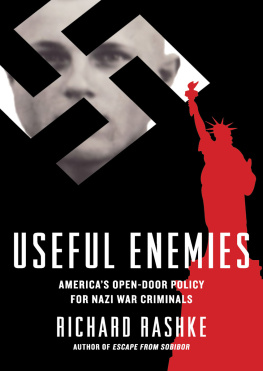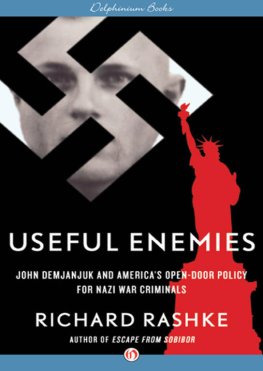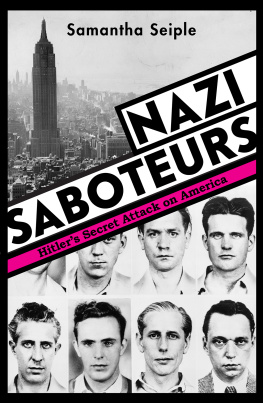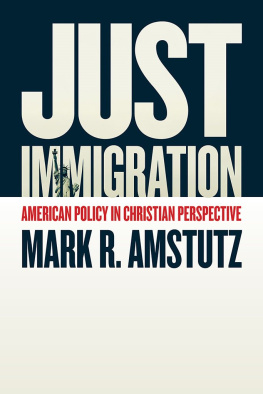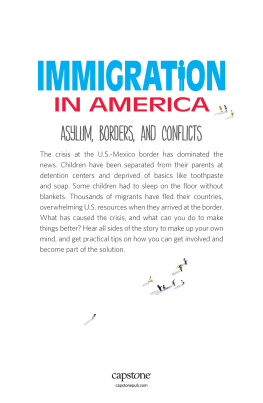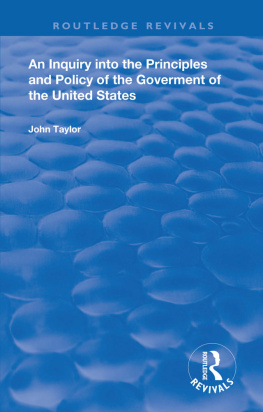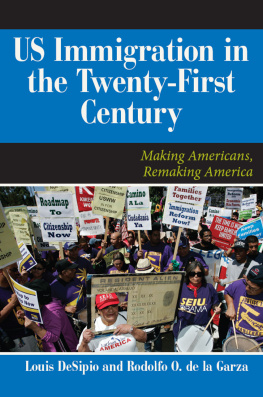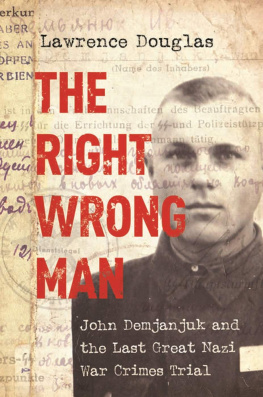Useful Enemies
Americas Open-Door Policy for Nazi War Criminals
Richard Rashke


To Paula
my essential
CHAPTER ONE
Anywhere But Here
B y all standards of fairness, the U.S. record on World War II refugees is embarrassing for a country that prides itself on its generosity. Beginning with the Evian Conference in 1938 and culminating in the Displaced Persons Act of 1948, the United States was blatantly selfish, timid, callous, and discriminatory. It is a chapter of history that Americans would prefer to leave resting in the coffin of ancient history.
If the United States was slow to admit World War II refugees from Europe, it was a tortoise in the hunt to find and expel thousands of former Nazis and Nazi collaborators hiding among the 400,000500,000 refugees it had been shamed into accepting. American sentiment was to let sleeping Nazis lie and the United States only entered the hunt, bickering and screaming, in the late 1970smore than thirty years after the war. The reasons it took so long are clear: Most Americans couldnt have cared less about a bunch of former Nazis as long as they behaved themselves; some felt that old Nazis were better than Jews; the U.S. government didnt want to take time from the Cold War to smoke out former Nazis who were now loyal, contributing members of American society; and America had dark secrets to protect.
The first time the United States showed its hand in the refugee poker game was at the international, invitation-only conference in Evian-les-Bains, France, in the summer of 1938, six months before Kristallnacht, Hitlers first major salvo in his war against Jews. More than 150,000 German Jews had anticipated the murder and mayhem of Kristallnacht and fled Germany in the vain hope of finding a home elsewhere. When Hitler annexed Austria (in the forcible union known as the Anschluss) in March 1938, another 200,000 Jews became either homeless or at risk.
Most of the wandering German and Austrian Jews wanted to settle in Palestine, but the British, who controlled that territory, had set a rigid quota. Great Britain was not about to turn Palestine into a dumping ground for European Jews whom other countries, including the United States, didnt want. To do so would risk yet another Palestinian Arab uprising.
Chaim Weizmann, a Zionist who would later become the first president of Israel, parsed the Jewish problem with laser precision. In an address to an international refugee conference in London, he said: The world seemed to be divided into two partsthose places where Jews could not live and those where they could not enter.
All eyes were on America, and President Franklin D. Roosevelt didnt relish the spotlight. Most Americans were nervous isolationists who didnt want to be drawn into someone elses war, and a good part of the working classes and WASP intellectuals were openly anti-Semitic. Roosevelt knew he had to do something. But what?
Ten days after the Anschluss, Roosevelt called for an international conference to address the growing refugee problem, which he foresaw was much larger than a few hundred thousand homeless Jews. France volunteered to host the meeting at Evian.
The call to action was more political than humanitarian. America was slowly emerging from the Great Depression and, although unemployment was gradually dipping, it still stood at a staggering 19 percent. Roosevelt found himself facing the twin pressures of isolationism and overt anti-Semitism. The latter had spiked in the 1930s with the advent of a string of anti-Semitic publications and the popular anti-Semitic radio addresses of Charles Coughlin, a Detroit Catholic priest. Father Coughlin had a following of more than forty million, and the Catholic hierarchy made no attempt to silence him.
Opinion polls at the time illustrate Roosevelts political dilemma. A 1938 American Institute of Public Opinion poll asked the following question: Should we allow a larger number of Jewish exiles from Germany to come to the United States to live? Seventy-seven percent said no. Other polls reported that one-third of Americans thought the government should economically restrict Jews and one out of ten favored racially segregating Jews as well as deporting them. Many members of Congress and the State Department, including U.S. consulate officials who had great discretionary powers in granting visas, reflected the nations anti-Semitism. The Veterans of Foreign Wars opposed the Evian Conference and called for the end of all immigration. And the American Coalition of Patriotic Societies challenged Roosevelt to stop the leak before it became a flood.
What was a president to do?
If he sought to admit more Jews into the country, Roosevelt knew he would be pouring gas on the embers of isolationism and anti-Semitism, thus running the risk of losing the upcoming presidential election. A consummate politician, Roosevelt called for a high-profile conference. It was a deft sleight of hand that would simultaneously make the United States appear humanitarian, offer a sop to Jewish voters, win applause from the majority of Americans for not caving in to international pressure, and discourage the unemployed from staging angry demonstrations. Roosevelt invited thirty-three other countries to Evian. Only Italy and South Africa declined.
A lone New York Times reporter, Anne OHare McCormick, sought to challenge Roosevelt, the conference attendees, and the American public. With amazing insight and clarity, she wrote:
It is heartbreaking to think of the queues of desperate human beings around our consulates in Vienna and other cities waiting in suspense for what happens at Evian. It is not a question of how many unemployed this country can safely add to its own unemployed millions. It is a test of civilization. Can America live with itself if it lets Germany get away with this policy of extermination?
Roosevelt wasnt listening. His invitation to Evian had reduced the conference to a cruel charade even before the first tap of the gavel. It said in part: No country would be expected or asked to receive a greater number of immigrants than is permitted by its existing legislation. Having said that, the conference challenged the participating countries to accept more German and Austrian (Jewish) refugees either under their quota systems or current immigration laws, something the United States itself was unwilling to do.
Evian was little more than a ten-day paid vacation at the Royal Hotel, a luxury resort on Lake Geneva. Casino gambling, pleasure cruises on the lake, outings to Chamonix for summer skiing, five-star dining, mineral baths, massages, golf In the end, the conference turned out to be historic, but not in the way Roosevelt had anticipated or hoped.
Hitler believed that Western democracies were cowardly and hypocritical. Evian proved him right. The United States did not send a single government official, high or low, to represent it at the conference because it didnt want to antagonize Hitler. Instead, Roosevelt chose a friend, steel tycoon Myron C. Taylor, and gave him the title of Ambassador Extraordinary Plenipotentiary. One of Taylors mandates was to ban the use of the words German Hitler Jew during the conference, to which Third Reich observers had been invited. Roosevelt didnt want to upset them.
Prior to the conference, the United States and Great Britain struck an under-the-table deal: Britain agreed not to bring up the fact that the United States was not even filling its legal German-Austrian emigration quota, if America would not propose that Palestine accept more Jews. As a result, the word
Next page
